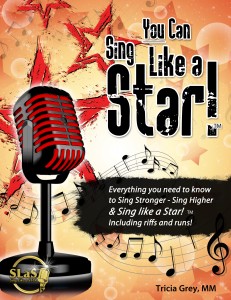Tricia Grey, MM
Deciding to pursue a degree in musical theater means you are serious about making performing your job after graduation. These programs are highly selective; only a few spots are available each year and there are hundreds of applicants so the competition to be accepted is fierce (as it is in the real world of performing). The sooner you start preparing by taking weekly voice and dance lessons and preparing your audition material, the more you increase your chances of being accepted. I’m talking about years of preparation here, not months!
And before you even apply, realize that good grades and ACT/SAT test scores are crucial these days. Even if you are the most talented kid in your high school, your grades matter. A lot.
Getting the lead in your high school musical might be a good indicator that you have talent, but a college degree program and success in the world of musical theater are much more demanding. You need to be functioning at a very high level of skill in singing, dance, acting and stage movement. You don’t get this degree of development overnight. It takes years of hard work.
You need to be extremely versatile in your ability to sing and dance in different styles of music; musical theatre roles today cover the gamut from classical sounding legit roles to hard rock singing and gospel. Your appearance and “type” play a large role in whether or not you are selected; being overweight might cause you to be “typed-out” of the ingenue roles, for example, even if that is your vocal quality. Get into the best physical shape you can with healthy food choices (no processed food or fast food, lots of vegetables and fruit, and no sugar) and lots of exercise.
Most university degree programs are geared toward training the classical singer. This will not help you if your goal is musical theater. You need to be sure the school you are attending actually has a degree program in musical theater, not just voice. Make sure the instructors have a track record of actually being successful performers themselves.
The most competitive schools are on the East Coast and receive thousands of applications every year. Of these, they may audition a few hundred and select maybe fifty students. Many programs have as few as ten openings. There are always more slots for men than for women, particularly sopranos. The benefit of studying at an East Coast school (in New York for example) is that you can sneak out to audition in the real world of Broadway (although the schools tend to frown on this because they don’t want to lose their students). For this reason alone, it is worth at least making a try for these prestigious schools.
A great way to prepare early for college auditions is to attend summer musical theatre programs. This will allow you to see how you measure up against the competition and to hone your skills by spending 12-18 hours a day for several weeks doing nothing but rehearsing and performing. You will also find out if you love musical theatre as much as you thought you did!
Preparation is the key to success in auditions of all kinds. Take your college auditions very seriously and prepare very early. Ideally, most of the preparation work should be completed by the end of your Junior year. The longer you have been preparing and rehearsing, the more likely you are to give a professional quality audition. You may think you will be fine with a “last-minute” approach, but your lack of preparation will always be apparent to the auditors. They do know the difference.
Begin by doing your research on all the college and university programs available. Research the curriculum and degree programs they offer. You should know the difference between a BA (Bachelor of Arts) degree and a BFA (Bachelor of Fine Arts) degree and how each will affect your chances of success after graduation. Research the faculty at each school- their degrees, performing background and philosophy. Research the audition requirements for each school- they are all different!
Don’t choose only one school and limit your options. There is lots and lots of competition, and sometimes choices are made based on factors other than talent- like what “type” they need in their program. Audition for as many schools as you can. Go to the school and spend some time on campus before the audition. Talk to the students in the program to see how they like it and whether the program actually delivers what they were expecting. This is pricey because of the travel costs but may well save you many thousands of dollars in education costs by preventing you from picking a school you won’t be happy with.
The earlier you start preparing your vocal and monologue material the more professional you will appear. Don’t even think about choosing a song or monologue any less than six months before your audition. And then rehearse them until you are sick of them, and rehearse some more! I can’t say it too many times- work with a professional voice teacher who will develop your voice and help you choose material. For years, not weeks. Work with an acting coach to prepare for the monologue audition. Select material based on their recommendations, not on your favorite song. You need professional guidance here.
Be organized. For each school, you need to create a spreadsheet with the appropriate dates and deadlines and contact information including application deadlines, audition dates, contact personnel, financial aid deadlines, and early decision deadlines. Gather your letters of recommendation early (you will usually need 3-5 of these).
If there are multiple audition dates, select the earliest one possible, not the last possible date. Auditors are human too, and are usually very tired at the end of audition season.
Choose material you are good at, really love, and that is right for your “type”. Do not use material from super-current Broadway shows since it is usually overdone and often age inappropriate.
For the audition, bring a small black 3 ring binder with your audition songs in a non-glare sleeve front to back, with appropriate cuts. Don’t just scribble out the sections you are eliminating; create a whole new piece of music by cutting out the sections you want, pasting them on a new sheet, and photocopying. Have a professional do this for you or it will be a mess. Mark endings clearly. Do NOT bring music that is stapled, or loose sheets of paper that will droop and fall off the piano. You will look extremely unprofessional and your accompanist will not be able to play well for you. Include several copies of your bio and professional headshots in the black 3 ring binder.
Be sure you allocate plenty of time to warm up before you go to the audition, and plan to arrive WAY early. Getting there at the last minute or late because you got lost or overslept or there was traffic or any other reason is unacceptable.
Dress appropriately. The auditors judge you based on your appearance before you even open your mouth. Do not dress to look sexy or show up looking unkempt. Be professional. Choose wardrobe that reflects who you are, as well as perhaps suggesting your character in the songs and monologue you choose. Solid colors are better than prints. Be subtle rather than wild. Don’t wear all black (or all white for that matter). Don’t wear shoes with really high heels, or really pointy toes. Be conservative. Never dress casually in jeans or flip flops. Wear your hair back from your face so they can see your eyes.
Be extremely aware of the time limit restrictions. The auditors will know if you go over your time limit and you will not be perceived favorably, no matter how well you sing. Follow the rules.
Things that can adversely affect the auditors’ impression of you include: language (please use good grammar), chewing gum, clothing that is unprofessional, shoes that are too high, hair that is too crazy, is in your eyes, or is dyed weird colors, heavy makeup, poor posture, and “tics” such as hand movements, wandering eyes, or swaying around when you sing. You need to video record yourself many, many times while rehearsing your audition material to eliminate nervous tics. Take these recordings to your acting coach and voice coach.
During the audition, stay within the boundaries designated. Don’t get too close to the auditors or interact with them during your monologue even if you think it’s a cool idea. It’s not. Use your “fourth wall”! Don’t invade their space- this makes them uncomfortable and they need some distance from you to be able to observe you. Don’t be overly assertive or cocky- be polite and confident but not arrogant. Acknowledge the auditors with a smile and an agreeable expression, but don’t initiate conversation or ask how they are doing.
Practice your “slate” endlessly. This is the introduction of your name, song and the title of your song. Just say the title- don’t give the author, what musical the song is from, or why you choose it. Say “My name is _____________________ or I am _____________________and I will be singing __________________”. Say your name clearly so they understand it. Smile and look happy to be there, even if you are nervous! And NO DISCLAIMERS-EVER! No auditor wants to hear excuses such as “I’m usually better than this, but I have a cold/didn’t get much sleep/got lost getting here” etc, etc, etc. Don’t say anything about all your challenges- just focus on the task at hand- giving the best audition you can, in this moment, with all the challenges you are facing. Good training for life.
Manners go a long way. Be polite to everyone- from the person who opens the door to the accompanist (who you should be VERY polite to if you want them to play well for you). Don’t snap your fingers or tap your foot to indicate tempo to the accompanist-quietly sing a few phrases to the accompanist to give them the tempo. Your music should be cleanly copied and placed in sleeves front-to-back in a small black 3-ring binder so the pianist does as little page-turning as possible. Do not bring chord charts, books, music with only a melody line, or music that is in the wrong key. Don’t bring a huge neon orange binder with every song you ever sang in it. Choose material that is not extremely difficult for an accompanist-they may be seeing it for the first time and you will not get the chance to rehearse with the accompanist. Point out any ritards (places where the music slows down) in your sheet music. If something goes wrong during the audition, don’t glare at the accompanist- just finish the song as if nothing happened. Be professional. Chances are, if the accompanist makes a mistake it is because the music is not professionally presented.
Do not choose to sing a cappella- use the accompanist (most professional) or a pre-recorded track (less professional). You can always choose to bring your own accompanist if you feel more comfortable auditioning with someone you have rehearsed with. This person should be a professional accompanist, not your mom or your best friend.
The songs you perform should be of differing styles- one ballad and one uptempo. Ideally one song should be in belt and the other in legit style (head voice). Do not choose two songs from the same musical or by the same composer. Do one serious song and one that is more light-hearted or funny. The songs should be blocked- movement should be planned and rehearsed endlessly before the audition. Don’t think you will be inspired to the right movement when you get onstage- it doesn’t work that way. Every gesture and move needs to be planned and rehearsed.
It’s not necessary to actually dance, but do move appropriately for the song. If there is not a specified time limit, keep the song length short. If you choose a lengthy song you will be cut off before you finish. Show them what you can do as quickly as possible. Show as much range and power and dynamic contrast as possible in the shortest amount of time possible, and the auditors will love you for it. Choose songs that are age-appropriate.
Research the character and read the script from the musical so you know what the character is all about and what they are experiencing at the moment they sing the song. Know the time period, geographic location, and historical events surrounding the era of the musical. Stay away from material that uses character voices, accents, etc. Do not imitate a famous singer’s performance- make the interpretation your own. What they want to see is your interpretation of the song and your connection to the emotion of the song, not a re-hash of someone else’s interpretation.
Many of the schools also require one or two classical pieces as well- singing well in Italian, French or German is especially impressive. Of course this needs to be something you have worked in extensively in private voice lessons. The Italian, French, and German art song repertoire is appropriate for this section. If you learned an Italian piece to audition for All-State, use that. Be sure it’s something you have sung for a long time and are completely familiar with. Last minute preparations will cause you to fail in every part of the audition, but particularly this one. Foreign language lyrics will be forgotten in the stress of the audition. Prepare early!
Besides the singing portion of the audition you will do a monologue and a dance audition. For the monologue, choose something age-appropriate that feels truthful to you. Don’t use dialect or accents. Choose something from a straight play or film, rather than a musical. Be sure you have done your research and know the play, the character, the character’s motivation, and what is happening at the moment you are speaking, etc. Don’t try to be shocking or rude by choosing monologues that are in bad taste or that use trashy language. The monologue you choose should be one that made you laugh or cry when you first read it- one that you feel a connection to. Don’t mime actions such as opening doors. You can bring small (not large) props and you will be able to use a chair if you like.
When you announce your monologue, you will say the name of the piece and play that it comes from, but don’t launch into a description of the character or the scene. Rehearse this bit, along with rehearsing the monologue, endlessly. Video-record your rehearsals, critique yourself and do it again (and again). This is an excellent way to see yourself as others see you. As with the singing portion, smile and say thank you when they cut you off or you are finished.
The dance part of the audition is done in a class setting. For the dance portion of the audition, wear professional dance attire, not sweats or shorts. Bring the correct shoes- ballet slippers, jazz shoes, tap shoes, and character shoes. You will get a warm-up (which the whole group does together), a ballet combination, and a jazz combination which are taught to the group and then performed in groups of four or five. Keep your hair out of your face, wear professional dance attire, and do not chew gum. Be professional! If dance is not your strongest skill, do the best you can, graciously and with a smile. Be willing and be teachable. Don’t stop the class or ask a lot of questions that slow the process down. Just do your best. They know that every student who auditions is not a prima ballerina- they want to see if you are teachable and humble.
Say “thank-you” with a smile at the end of each section of the audition and exit quickly. Be kind to your fellow auditioners, and be helpful when possible. Don’t be a diva, be a team player. Show that you are confident but teachable and humble. It will pay off!
Start building your repertoire early. (Like in the eighth grade!) You need many different styles represented in your repertoire. This is why I say you need to start preparations years, not months, before the audition process.
What you need in your repertoire:
A comedic and a dramatic classical monologue. The classical era includes Greek classics, Shakespeare, and Restoration era monologues.
A comedic and a dramatic modern monologue. The modern era includes Williams, Inge, Miller, and Shaw.
A comedic and a dramatic contemporary monologue. The contemporary era includes Wasserstein, Wilson, Henley, and McNally.
A monologue from a musical. Pick one that is age appropriate!
A classic musical theatre ballad and a classic musical theatre uptempo song. The classic era includes Irving Berlin, Cole Porter, George and Ira Gershwin, Rodgers and Hart, and Rodgers and Hammerstein).
A modern musical theatre ballad and a modern musical theatre uptempo song. The modern era includes Lerner and Lowe, Herman, Jules Styne, and Loesser.
A contemporary musical theatre ballad and a contemporary musical theatre uptempo song. The contemporary era includes Sondheim, Webber, Wildhorn, Lippa, Guettel, and Larson.
A classical aria and a piece from an operetta. Arias could come from operas such as La Boheme or an art song from the 26 Italian Art Songs and Arias book, and operetta includes The Merry Widow by Lehar.
A patter song that shows your ability to execute rapid language.
A pop/rock song. NOT a rap song. Something melodic that shows range and your ability to mix and sing strongly in the upper register such as a Mariah Carey song- IF you can do the riffs and runs cleanly and in tune. If you are not a good R & B stylist, choose a power ballad like a Celine Dion song if you are female or a Steve Perry (from the band Journey) song if you are male.
A 1940’s era big band song such as Cheek to Cheek.
A 1950’s-1960’s rock song such as Unchained Melody by the Righteous Brothers, or Cryin’ by Roy Oribison, which show lots of range.
A country-western song such as Stand By Your Man by Tammy Wynette or Crazy by Patsy Cline.
See why I say you need to start vocal study early? This is a lot to know, and you can’t acquire professional levels of these skills overnight! Guess what that means? You have to determine your priorities early in the game. You have to make your training and practice a priority, even at the expense of fun school and social activities that are time draining. Even at the expense of television, netflix, facebook, and other social media. If you are serious, that is what you will choose to do. There is only so much time in the day, and if you really want to succeed you need to prioritize your time. Those who are successful have done exactly that, and they can tell you that you won’t regret it if you become successful in the business! It’s a trade-off. Make your choices early!
This article is from the book YOU Can Sing Like a Star! by Tricia Grey, MM.
To purchase the book or to schedule lessons by skype or in-person please visit the website at www.singlikeastar.com



